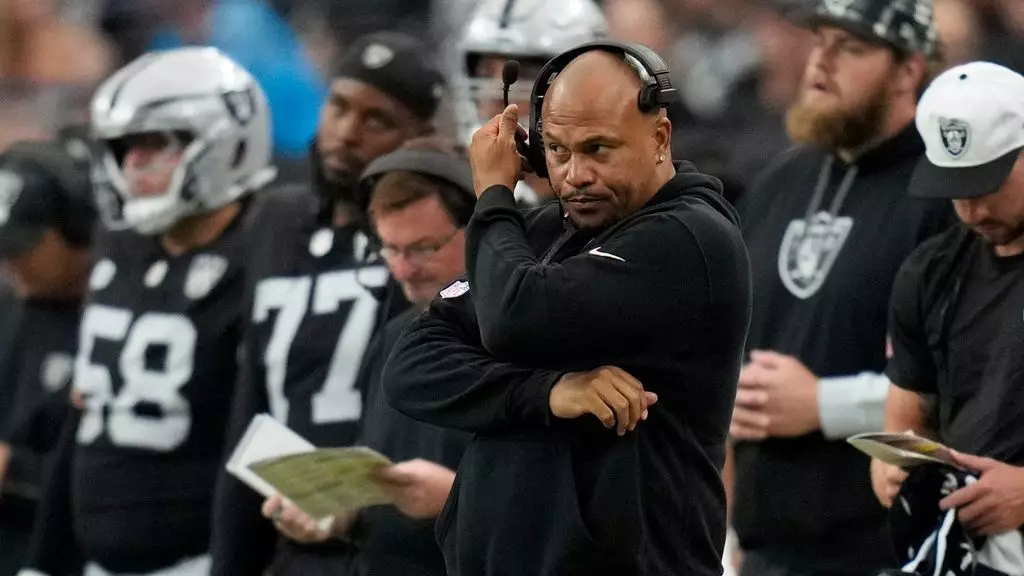In a world where sports can ignite passions and bring communities together, the Las Vegas Raiders faced a harsh reality check during their home opener against the Carolina Panthers. A disheartening 36-22 defeat left head coach Antonio Pierce visibly shaken as he grappled with the implications of a game that showcased an embarrassing lack of effort. While the emotions still lingered in the air post-match, a closer examination of the circumstances reveals deeper issues within the team’s dynamics and performance.
The Raiders entered their home opener against a struggling Panthers team, fresh off a morale-boosting win against the Baltimore Ravens. Everything seemed poised for a triumphant return to Las Vegas, yet the outcome was a resounding defeat. The Panthers, having replaced their first overall pick quarterback Bryce Young with seasoned veteran Andy Dalton, smelled an opportunity to capitalize on the Raiders’ vulnerability. The result? A game that saw the Raiders severely outmatched, succumbing to an opponent they were expected to dominate.
Pierce’s ire was clear as he expressed his disdain for what he termed “business decisions” made by some players during the crucial moments of the game. This candid outburst hinted at a concern that transcends mere tactics—it suggests a deeper, pervasive issue of motivation and commitment from players who should know that every snap counts. The analogue of a team that must confront harsh truths is as vital as the strategy they deploy on the field.
Defensive end Maxx Crosby echoed Pierce’s sentiments, emphasizing the necessity for players to engage in self-reflection. Crosby, who battled through physical limitations in this game, underscored the notion that each individual must account for their performance. Such comments are essential to rebuilding morale and fortifying the collective ethos of the squad. After all, professional sports thrive on accountability, and this loss served as both a wake-up call and a rallying cry to rectify the missteps that occurred.
Although players like Davante Adams expressed confusion regarding Pierce’s remarks, it raises a pivotal question: what constitutes a “business decision” on the field? Many athletes carry the weight of expectations, and deciphering the line between strategy and self-preservation can be daunting in high-pressure situations. Understanding how to motivate oneself and one’s teammates to give their all plays a significant role in transforming a talented roster into a successful team.
Examining the Raiders’ game statistics reveals a sobering narrative. The Panthers racked up 437 total yards while commanding the time of possession—36 minutes and 2 seconds to the Raiders’ 23 minutes and 58 seconds. Furthermore, Las Vegas managed a meager 55 rushing yards out of a total of 331 offensive yards. The team appeared to languish under the burden of poor execution rather than a lack of talent.
This divergence between potential and execution must be a focal point for Pierce and his coaching staff. Transformation requires evaluating not just strategic frameworks but also individual roles and responsibilities. Outreach beyond the field—training sessions, discussions, and rebuilding trust within the team dynamics—becomes imperative in pursuing game-day success.
In sports, growth often emerges from adversity. Aidan O’Connell’s late-game insertion into the lineup offered a glimpse of the potential the Raiders possess, despite the disarray surrounding them. As he orchestrated a commendable touchdown drive towards the end of the game, hope flickered. This anecdote illustrates the multi-faceted nature of a football team—the belief that the right combination of players, systems, and support can bring forth remarkable outcomes.
While the loss against the Panthers could be perceived as a singular setback, it carries the weight of a lesson both for the players and the coaching staff. Every loss has the capacity to reinforce the team’s need to bolster resilience, rekindle communication, and restore unity in the locker room. From Pierce’s disappointment to the words of his players, this moment can serve as a pivotal junction that sparks the drive for improvement.
As the Raiders set their sights on the next game, they must do so with a commitment to studying former failings meticulously. They need to channel the frustration experienced during this setback into motivation for the journey ahead. The pain of defeat may sting now, but as history has shown in sports, the path to greatness is often paved through hardship and growth. In this, the Raiders still hold the possibility of harnessing their true potential, beginning with a renewed commitment to unity and excellence.



Leave a Reply